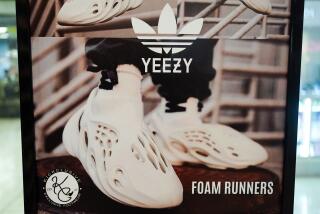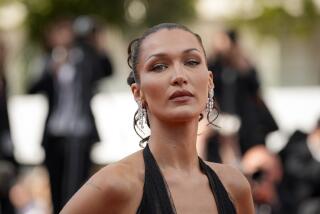Nike Gets the Boot : Spain Denies Firm’s Right to Trademark
- Share via
Nike was barred Wednesday from selling or advertising its sports apparel in Spain, when the country’s highest appeals court denied an eleventh-hour pre-Olympics appeal by America’s biggest athletic shoemaker.
But Nike says it is going to just do it anyway--sort of.
The company has already paid millions of dollars to place its name on the U.S. Olympic track team’s uniforms. And when members of the team--from Carl Lewis to Jackie Joyner-Kersee--hit the track in Barcelona in a few days, all will be decked out in snazzy uniforms with the Nike name and logo.
That, after all, is not really advertising and, therefore, legal under the Wednesday ruling--or so the Beaverton, Ore., athletic shoe and apparel maker insists.
“We’ve gone round and round the block with it,” said Lindsay Stewart, vice president and counsel at Nike. “We feel we’re on solid ground.”
Meanwhile, the man who owns the Nike trademark in Spain insists that if athletes wear the Nike uniforms during the Olympic Games, he will do all he can to stop it.
“If they don’t comply, they’ll have to pay the consequences,” said Jose Antonio Hernandez, a lawyer for Juan Amigo Freixas, who purchased the trademark from a Barcelona sock company that registered it 60 years ago.
“We’ll talk with the judges, we’ll talk with the police, whoever,” Hernandez said in an interview with the Associated Press.
In the 1992 Summer Olympics, one thing is for certain: Nike knows headaches. Behind the court decision--along with a slew of ongoing countersuits by Nike--is a three-pronged debate that involves big money, botched marketing and the potential for serious image damage.
Nike claims it faces $20 million in lost revenue by not being permitted to sell its clothing in Spain. (It is still allowed to sell Nike brand shoes.) Meanwhile, Nike’s plans to market apparel in Europe--where the company is seeking immediate growth--could be stalled by the court decision. The action affects the Nike name only and not the crescent-shaped logo.
Marketing experts say Nike’s can-do image could also suffer amid this bickering. And there would certainly be embarrassment under one far-fetched scenario--should Spanish officials actually take any action to physically stop athletes from wearing the uniforms.
“This could be devastating to Nike,” said Joel Portugal, partner at the New York-based corporate image firm, Anspach Grossman Portugal. “It not only hurts them in Spain, but it could hurt them globally.”
Marketing--and image--mean everything to Nike. The company will spend about $100 million in 1992 for worldwide advertising and marketing.
Rival Reebok faced its own image problems when a decathlete it built an entire ad campaign around failed to even make the Olympic team.
But it is Nike that may ultimately pay the steepest price in the Olympics. One top industry executive close to Nike said that several years ago, Philip Knight, Nike’s chairman, thought he could win the battle in court and rejected an offer for $5 million to buy the rights to the Nike name in Spain. When he saw that the odds were against Nike, Knight is said to have offered to pay the $5 million in recent weeks--only to be told the price had jumped to $50 million.
There is some speculation in the sports apparel industry that, as a result of the court decision, Nike may have to remove or modify a giant mural it has erected in downtown Barcelona featuring basketball star Michael Jordan and pole vaulting champion Sergei Bubka in Nike sportswear.
There are marketing ironies aplenty at the Olympics. While clothed in uniforms provided by Nike, a number of athletes are under contract to wear athletic shoes courtesy of Reebok. And while the track teams will be wearing Nike uniforms when they compete, rival Reebok--which is an official Olympic sponsor--is supplying the uniforms to be worn by the track team during the medal ceremonies.
Although Nike cannot use its name on clothing sold in Spain, it continues to sell clothing there without the name. Ultimately, however, it is the name that consumers look for. Nike has countersued, claiming that its trademark is being ripped off and used in ads by the Spanish firm.
One former Olympic gold medalist said Nike will likely be hurt by all this. “Everybody has to compete in every country,” said Al Oerter, four-time U.S. Olympic gold medalist in the discus. “All that this means is that some other brand will gain on them.”
Times Sports Editor Bill Dwyre contributed to this story from Barcelona.
Nike’s Olympic Obstacles
* Olympic Involvement: Nike has paid millions of dollars to put its name on U.S. and Algerian track and field teams in Barcelona. A lawyer for the Spanish attorney who owns the Nike trademark in Spain says the courts have now definitively prohibited the athletes from wearing the Nike name. Nike insists the courts have made no such decision, and it plans to dress the track stars in its uniforms.
* The Costs: Spanish courts have also prohibited Nike from selling clothing bearing its name in Spain. Company documents put resulting potential lost revenue at $20 million in Spain and several times that figure worldwide.
* The Marketing Morass: Nike is not an official Olympic sponsor; Reebok is. All U.S. medal winners will be wearing uniforms with the Reebok emblem during medal ceremonies--even if they wore Nike’s uniforms while actually winning the medals.
More to Read
Go beyond the scoreboard
Get the latest on L.A.'s teams in the daily Sports Report newsletter.
You may occasionally receive promotional content from the Los Angeles Times.







